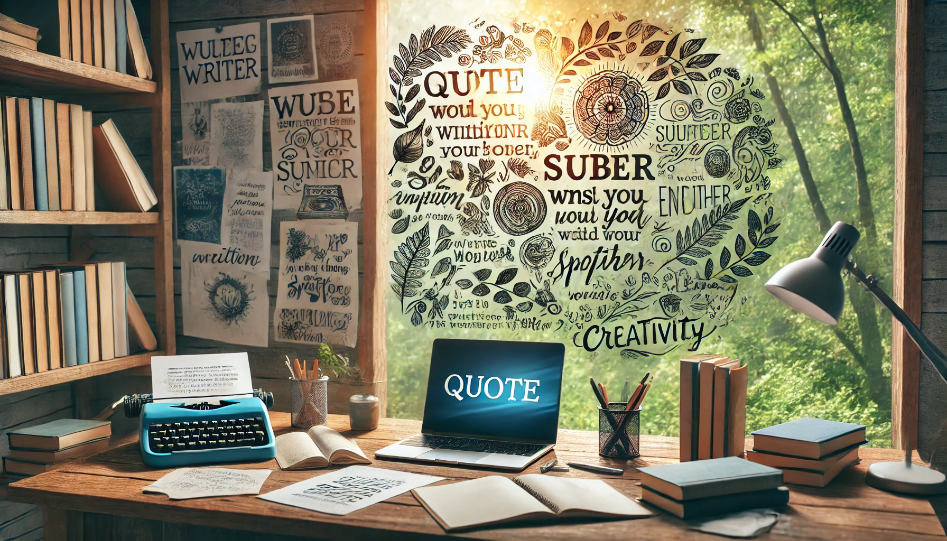Quote Writers: Crafting Words That Inspire, Motivate, and Resonate

Quote writers have a unique talent for capturing profound thoughts and emotions in just a few carefully chosen words. Whether it’s an inspiring message, a reflective statement, or a humorous insight, quotes have the power to connect with readers on a deep emotional level. Writers who specialize in quotes distill complex ideas into simple, memorable lines, creating wisdom that can last for generations.
At SmartBooksBuzz, we explore the many facets of the writing world, from Writers’ Retreats to Cartoon Writers and Illustrators. Let’s dive into what makes quote writers so impactful and how they hone their craft.
The Art of Writing Quotes
Writing quotes requires a blend of creativity, clarity, and emotional insight. It’s about finding the perfect words to express a thought in a way that resonates with readers. Whether the quote is meant to inspire, reflect, or entertain, the writer’s ability to evoke emotion is key.
One of the hallmarks of great quotes is their ability to encapsulate universal truths in concise language. Some examples include:
- “The only limit to our realization of tomorrow is our doubts of today.” — Franklin D. Roosevelt
This quote emphasizes the power of self-belief and has resonated with readers for decades. - “Do not dwell in the past, do not dream of the future, concentrate the mind on the present moment.” — Buddha
A timeless quote about mindfulness and living in the present.
Why Quote Writers Matter
Quotes have become more popular than ever in the digital age. Social media platforms are flooded with quote posts that inspire, motivate, and bring a sense of connection to the reader. The ability of quote writers to communicate a powerful message in just a few words makes their contributions invaluable to various forms of media.
Quote writers are often seen as thought leaders, capable of influencing how people perceive and engage with the world. Their words are shared widely in speeches, books, social media, and personal journals. As the demand for impactful, shareable content continues to rise, quote writing remains an essential skill.
Tips for Aspiring Quote Writers
If you're interested in becoming a quote writer, here are some tips to get you started:
- Focus on Clarity
The best quotes are simple and easy to understand. A clear message leaves a lasting impression on readers. Avoid overly complex language or ideas that may dilute the message. - Find Emotional Connection
Quotes should evoke emotion. Whether it’s inspiration, joy, sadness, or reflection, great quotes make readers feel something. This emotional connection is what makes quotes memorable. - Write Often
Like any form of writing, practice is key. Make quote writing a part of your routine. To help with consistency, explore our tips in Writers' Routine: The Key to Consistent Creativity and Productivity for keeping your creativity flowing. - Seek Inspiration from Daily Life
Many powerful quotes come from personal experience or observation. Pay attention to moments of insight in your everyday life. Whether it’s a conversation with a friend or a quiet moment of reflection, you can find inspiration anywhere. - Use Metaphor and Imagery
Great quotes often use vivid imagery or metaphors to illustrate a point. This can help make abstract concepts more relatable and memorable for readers.
Famous Quote Writers and Their Impact
Many famous writers and thinkers have made their mark by crafting memorable quotes. Here are a few who excelled at distilling wisdom into powerful lines:
- Maya Angelou
Known for her profound insights on life, love, and resilience, Angelou’s quotes continue to inspire millions:
“People will forget what you said, people will forget what you did, but people will never forget how you made them feel.” - Mark Twain
Famous for his humor and wit, Twain’s quotes are filled with insight and irony:
“The secret of getting ahead is getting started.” - Albert Einstein
Einstein’s quotes often delve into imagination, curiosity, and the mysteries of life:
“Imagination is more important than knowledge. For knowledge is limited, whereas imagination embraces the entire world.”
Using Quotes in Storytelling and Art
Quotes aren’t just for social media or speeches. They are also a powerful tool in storytelling and illustration. For instance, Cartoon Writers and Illustrators often use quotes and dialogue to enhance their characters’ depth, humor, and relatability. A single line can encapsulate a character’s personality or convey a major theme within the story.
Finding Inspiration at Writers’ Retreats
For those seeking new ideas or looking to refine their craft, Writers’ Retreats offer the perfect environment. These retreats provide quiet, focused time away from the demands of daily life, allowing quote writers to connect deeply with their creativity. The combination of reflection, solitude, and workshops helps writers develop new ways to approach their work, often leading to fresh, insightful quotes.
Conclusion: Crafting Quotes That Resonate
Quote writing is an art form that requires practice, emotional insight, and a deep understanding of language. Whether you’re inspiring others, making people laugh, or offering wisdom, your words have the power to make a lasting impact. By creating a routine, drawing from daily inspiration, and attending events like retreats, you can hone your skills and create quotes that resonate with a wide audience.
At SmartBooksBuzz, we’re passionate about helping writers and creatives unlock their full potential. Explore our resources on Writers' Routine, Cartoon Writers and Illustrators, and more to continue your writing journey.
